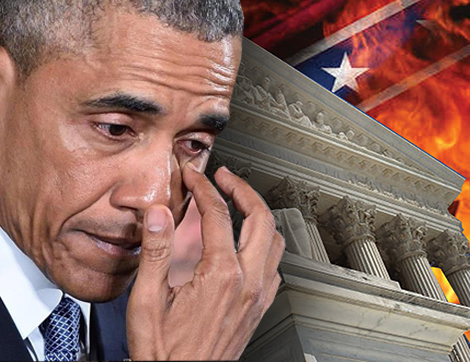
• Hurt feelings: High court takes bite out of First Amendment.
By Glen Allen —
First Amendment doctrine as it developed since the early 20th century has been a singular achievement for civil liberty. Among its more remarkable aspects is its refusal to allow mere social offensiveness to justify restrictions on speech. The Supreme Court reaffirmed its commitment to this aspect in its 2011 Snyder v. Phelps opinion, which involved picketing by members of the Westboro Baptist Church at funerals of soldiers killed in Iraq. Yet, in addition to the lamentable fact that courts’ actions often fail to live up to their words, serious issues have arisen in First Amendment doctrine itself. The same set of Justices who decided Snyder v. Phelps recently issued an opinion in Walker v. Texas Sons of Confederate Veterans that is alarmingly hostile to the principle that the offensiveness of speech should not determine its constitutional protections.
In 2009, the Texas Sons of Confederate Veterans applied to the Texas Motor Vehicle Board to sponsor a license plate design that included the words “Sons of Confederate Veterans” and a faint Confederate battle flag in the background. Texas law vests in that board authority to approve or disapprove a design “if the design might be offensive to any member of the public.” The board invited public comment on its website and at an open meeting. After considering the response, the board voted unanimously against issuing the plate because “public comments had shown that many members of the general public find the design offensive.” The board reached this decision even though it had approved over 300 other specialty plate designs and mottos, including “Buffalo Soldiers” and “Fight Terrorism.”
Invoking the First Amendment, the Confederate Sons brought a lawsuit that put the Texas board in a quandary. First Amendment precedents make perfectly clear that the offensiveness of speech is no ground for suppressing it. The board therefore sought to avoid the First Amendment altogether by asserting the newly minted so-called “government speech” doctrine, which the Supreme Court had articulated just six years prior in a different kind of case. This new and dangerous doctrine holds that when the government speaks in its own voice it is not subject to the First Amendment. The Confederate Sons case then wound its way to the Supreme Court where, in a 5-4 decision (the five consisting of the three Jewish justices, the Hispanic justice, and the African-American justice), the high court held that the government speech doctrine applied and the First Amendment therefore was excluded. On these grounds the court upheld the board’s refusal to allow the Confederate Sons specialty plates.
Emigrate While You Still Can! Learn More . . .
As Justice Samuel Alito aptly stated in his blistering dissent, the majority opinion takes a large and painful bite out of the First Amendment. Given an opportunity to reaffirm the vitality of the First Amendment, the majority opinion did the precise opposite, carving out a path for the government to sidestep the First Amendment entirely. How this government speech doctrine will develop from here is unclear but it is likely to be unfavorable to civil liberty, unless we, the American People, demand our First Amendment rights and assure that more principled and less politically correct justices sit on the Supreme Court.
Why, one may ask rhetorically, should the First Amendment protect offensive speech?
One answer is that what is offensive to one person may simply be another person’s attempt to, however crudely, articulate a truth or a legitimate grievance. A related answer is that it is not the government’s proper business to get involved in such issues, given that the “government” is not an abstraction but particular persons with their own biases, fears, and incomplete information. A final answer is that putting free expression at the mercy of public sentiment, as happened in Confederate Sons and happens in Canada and many other Western democracies today, ultimately leads not to authentic free expression but to the despotism of the herd instinct, swayed by emotion and easily inflamed and manipulated—a result completely at odds with the founders’ vision of the First Amendment.
Glen Allen is a respected attorney in Maryland.


That “Hispanic” judge is really another Jewish judge. Sotomayor is a Sephardic Jew, bring the total number of Jews on the Supreme Court to 4 out of 9, despite being only 2% of the general population.
Just as current republican presidential candidate Marco Rubio is definitely ethnically a Sephardic Jew, and the father of candidate Ted Cruz probably is.
The Ninth Circuit ultimately held that persistent government misrepresentation of hard (categorical or numeric) fact does not actionably violate the First Amendment.
See the article Federal Court Affirms Sweeping “Bully Pulpit” Government Right to Lie: Treasury Can’t Be Sued
GOD given liberty = RIGHTS.
So your article is NOT telling the whole truth.